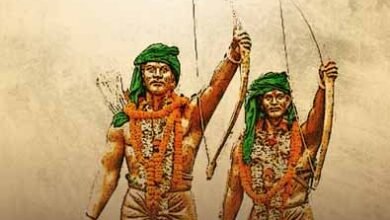
मंगोलों का हमला नाकाम करने वाला सुल्तान
भारतीय इतिहास का सबसे ताक़तवर शासक अलाउद्दीन खिलजी, बड़ी दिलचस्प है इनकी दास्तान अलाउद्दीन खिलजी का इतिहास बड़ा ही दिलचस्प रहा है अलाउद्दीन खिलजी दिल्ली के सुल्तान थे और वह खिलजी वंश के संस्थापक जलालुद्दीन खिलजी के भतीजे और दामाद थे इतिहासकारों के अनुसार यह माना जाता है अलाउद्दीन खिलजी खिलजी साम्राज्य का सबसे अधिक शक्तिशाली शासक रहा थे और उसने सुल्तान बनने के पहले इलाहाबाद के पास कड़ा नाम की जागीर दी गई थी जिसे उन्होंने संभाला था।
अलाउद्दीन खिलजी के बचपन का नाम गुरु शासक था अलाउद्दीन खिलजी के तख्त पर बैठने के बाद अमीरे उन्हें अमीर ए तुजुक से भी नवाजा गया.दुनियाँ की बड़ी बड़ी सल्तनत जब मंगोलो के ख़ौफ़ से थर थर कांप रही थी, तब उस वक़्त हिन्दुस्तान में एक ऐसा बहादुर और दिलेर शहंशाह हुकुमत कर रहा था जिनसे मंगोलो को एक बार नही बल्कि पांच बार युद्ध में शिकस्त दिया बुरी तरह हार का सामना कर रहे मंगोलो मे अलाउद्दीन ख़िलजी के नाम का ख़ौफ़ तारी हो गया था. अलाउद्दीन ख़िलजी दुनिया के ऐसे चंद शासकों में भी शामिल थे जिन्होंने मंगोल आक्रमणों को नाकाम किया और अपने राज्य की रक्षा की.
उन्होंने न सिर्फ़ बड़ी मंगोल सेनाओं को हराया बल्कि मध्य एशिया में मंगोलों के ख़िलाफ़ अभियान भी चलाया।एक बार तो उन्हे अफ़्गानिस्तान में घुस कर भगाया; उनके ख़ौफ़ का ये आलम था के हिन्दुस्तान पर हमला करने वाले मंगोल फ़ौज के राजा ने अपने चार हज़ार सिपाहीयों के साथ इस्लाम क़बुल कर लिया, जिन्हे आज के निज़ामुद्दीन में मुग़लपुरा बना कर बसाया गया था.इस अज़ीम फ़ातेह ने 1301 मे रंणथम्बोर फ़तह किया, 1303 में चित्तौड़, 1304 में गुजरात, 1305 में मालवा, 1308 में सवाना को फ़तह किया ,विंध्याचल कोहिसार पार करके 1308 में देवगिरी,, तो 1310 में वारंगल, 1311 में द्वार समंदर फ़तह किया,, 1311 में ही जालोर और परमार ख़ानदान की ताक़त को तोड़ा और पांडिया ख़ानदान को बाजगुज़र बनाया और एक मज़बुत हिन्दुस्तान की बुनियाद डाली जिसकी दारुलहुकुमत दिल्ली के ज़ेर ए निगरानी दकन का इलाक़ा भी था.अलाउद्दीन खिलजी के शासन काल में शराब और भांग जैसे मादक पदार्थों का सेवन तथा जुआ खेलना बंद करा दिया गया था.
अलाउद्दीन दिल्ली सल्तनत का पहला सुल्तान था, जिसने भूमि की पैमाइश कराकर राजस्व वसूल करना आरंभ किया. उसने केंद्र के अधीन एक बड़ी और स्थायी सेना रखी तथा उसे नकद वेतन दिया. ऐसा करने वाला वह दिल्ली का प्रथम सुल्तान था.
उसने धर्म को राजनीति से पृथक किया खलीफा की सत्ता को अपने राजकाज में क़तई हस्तक्षेप नहीं करने दिया अलाउद्दीन ख़िलजी ने जीवन की अत्यावश्यक वस्तुओं से लेकर विलास-वस्तुओं-जैसे दासों, अश्वों, हथियारों, सिल्क और सामग्री तक सभी चीजों के मूल्य निश्चित कर दिये थे. राजधानी के चतुर्दिक खालसा गाँवों में भूमिकर नकद के बदले अन्न के रूप में लिया जाने लगा. अन्न दिल्ली नगर की राजकीय अन्न-शालाओं में संचित किया जाता था ताकि दुर्मिक्ष के समय सुल्तान इसे बाजारों में भेज सके. अन्न का कोई भी व्यक्तिगत रूप में संचय नहीं कर सकता था. बाजारों पर दीवाने-रियासत एवं शहना-ए-मंडी (बाजार का दारोगा) नामक दो अधिकारियों का नियंत्रण रहता था.सुल्तान को बाजारों की दशा की सूचना देने के लिए गुप्तचरों का एक दल नियुक्त था. व्यापारियों को अपना नाम एक सरकारी दफ्तार में रजिस्ट्री कराना पड़ता था. उन्हें अपनी सामग्री को बेचने के लिए बदायूं द्वार के अन्दर सराय-अदल नामक एक खुले स्थान पर ले जाने की प्रतिज्ञा करनी पड़ती थी. उन्हें अपने आचरण के लिए पर्याप्त जामिन देना पड़ता था. सुल्तान के नियमों का उल्लंघन करने पर कठोर दण्ड की व्यवस्था थी. दुकानदारों द्वारा हल्के बटखरों का व्यवहार रोकने के लिए यह आज्ञा थी कि वजन जितना कम हो उतना ही मांस उनके शरीर से काट लिया जाए. बाजारों में अनाज का अपरिवर्तनशील मूल्य उस समय का एक आश्चर्य ही समझा जाता था.
अलाउद्दीन ख़िलजी ने ही भारत में लोगों को व्यापार करना सिखाया और अपने साम्राज्य को दक्षिण की दिशा में बढ़ाया। उनका साम्राज्य कावेरी नदी के दक्षिण तक फैल गया था।
============= ================ ==============
Alauddin Khilji, the most powerful ruler of Indian history, his story is very interesting The history of Alauddin Khilji has been very interesting. Alauddin Khilji was the Sultan of Delhi and he was the nephew and son-in-law of Jalaluddin Khilji, the founder of the Khilji dynasty. Before Allahabad, he was given a jagir named Kada, which he handled.
Alauddin Khilji’s childhood name was Guru Shashak. After Alauddin Khilji sat on the throne, he was also honored with Ameer-e-Tuzuk. The brave and courageous emperor ruling defeated the Mongols not once but five times in the war. Alauddin Khilji was also among the few rulers in the world who thwarted Mongol invasions and protected his kingdom.
He not only defeated large Mongol armies but also campaigned against the Mongols in Central Asia. Once he drove them into Afghanistan; It was due to his fear that the king of the Mongol army who attacked India accepted Islam along with his four thousand soldiers, who were settled in today’s Nizamuddin by making Mughalpura. This Azim Fateh conquered Ranthambore in 1301, Chittor in 1303, Gujarat in 1304, Malwa in 1305, conquered Savannah in 1308, crossed Vindhyachal Kohisar, Devgiri in 1308, then Warangal in 1310, conquered Dwar Samandar in 1311, Jalore and Parmar family power in 1311 itself Broke and made the Pandiya dynasty Bajgujar and laid the foundation of a strong Hindustan, whose Darulhukumat Delhi’s Zer-e-Nigriti Deccan area was also there. During the reign of Alauddin Khilji, the consumption of drugs like alcohol and cannabis and gambling was stopped.
Alauddin was the first Sultan of the Delhi Sultanate, who started collecting revenue by measuring the land. He kept a large and permanent army under the center and paid it a cash salary. He was the first Sultan of Delhi to do so.
He separated religion from politics and did not allow the power of the Caliph to interfere in his administration. Alauddin Khilji fixed the prices of everything from the essentials of life to luxuries such as slaves, horses, weapons, silk, and materials. In the Khalsa villages surrounding the capital, land tax was taken in the form of grain instead of cash. Food was stored in the state granaries of Delhi city so that the Sultan could send it to the markets during Durmiksha. No one could store food personally. The markets were under the control of two officers named Diwane-Riyasat and Shahna-e-Mandi (Governor of the market). A group of spies was appointed to inform the Sultan about the condition of the markets. Traders had to register their names in a government office. They had to promise to take their wares to an open place called Sarai-Adal inside the Badaun Gate to sell them. He had to give sufficient surety for his conduct. There was a system of harsh punishment for violating the rules of the Sultan. In order to stop shopkeepers from dealing with light goats, it was ordered that the lesser the weight, the more meat should be cut from their bodies. The invariable price of grains in the markets was considered a wonder at that time.
It was Alauddin Khilji who taught people to trade in India and extended his empire toward the south. His empire extended to the south of the river Kaveri.
Prabhakar Kumar.





